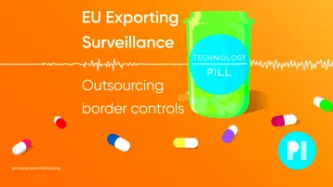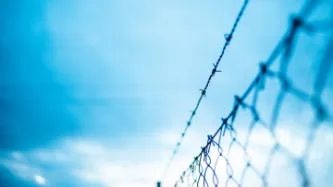Advanced Search
Content Type: Video
**Language advisory: Gus does several swearwords this episode including one f-word at 9:45
From surveillance drones to cameras to wiretapping and more - the EU are providing technologies that will be used to crush political and civil freedoms and undermine democracy without urgent reforms
Find out more:
https://privacyinternational.org/long-read/4288/borders-without-borders-how-eu-exporting-surveillance-bid-outsource-its-border
https://privacyinternational.org/…
Content Type: Advocacy
Section 187 of the Data Protection Act read with Article 80 of the GDPR gives individuals the option to seek assistance from public interest non-profit organisations to take action against data controllers which have infringed their data rights. In this role, non-profit organisations may:
make complaints to the regulator on the individual’s behalf;
represent the individual in the courts when seeking a resolution of those complaints; and
bring legal claims against organisations they believe…
Content Type: Examples
The US Centers for Disease Control and Prevention announced it would end screening of inbound international passengers from a group of countries including the UK, Brazil, Iran, Ireland, and the EU Schengen countries in the third week of September. CDC said it would replace the programme with new, “more effective” procedures such as better education about COVID-19, voluntary collection of contact information, recommendations for self-monitoring, and “potential” testing for COVID-19. As…
Content Type: Examples
In mid-September, “human error” led Public Health Wales to post the personal data of all 18,000-odd Welsh residents who tested positive for COVID-19 between the end of February and the end of August to a public server, where for about 20 hours it was readily searchable by any visitor to the site. For 1,926 people who live in enclosed settings such as nursing homes and supported housing, the data included the name of the setting; for the rest the information consisted of initials, date of birth…
Content Type: Examples
A nationwide US study plans to examine the impact on employer surveillance of the shift of workers from on-site office environments to working in their homes. The authors intend to highlight worker (dis)comfort and concerns.
Source: https://covid19research.ssrc.org/grantee/how-covid-19-is-changing-workplace-surveillance-american-workers-experiences-and-privacy-expectations-when-working-from-home/
Writer: Jessica Vitak and Michael Zimmer
Publication: Social Science Research Council
Content Type: Examples
As working from home expands, employers are ramping up surveillance using the features built into software such as Microsoft Teams and Slack, which report when employees are active, or requiring employees to attend early-morning video conferences with webcams switched on. In early 2020, PwC developed a facial recognition tool to log when employees are away from their home computer screens.
Source: https://www.theguardian.com/world/2020/sep/27/shirking-from-home-staff-feel-the-heat-as-…
Content Type: Examples
The US company Hubstaff, which provides monitoring software to employers, says its UK customer base quadrupled between February and October 2020. The software tracks workers’ hours, keystrokes, mouse movements, and website visits. The Chartered Institute of Personnel and Development warns that workplace surveillance can damage trust.
Source: https://www.bbc.co.uk/news/business-54289152
Writer: Lora Jones
Publication: BBC
Content Type: Examples
The Citizen app, which was designed to allow users to see unverified reports of crime in their neighbourhoods, is partnering with Los Angeles County for its contact tracing app, SafePass, which uses Bluetooth and GPS to track interactions with other people. Citizen has been criticised in the past for inundating people with crime alerts and inspiring panic in times when crime rates are at a historic low, and public safety experts and lawmakers are concerned that the repurposed app could create…
Content Type: Examples
While countries like New Zealand, Singapore, and South Korea publish detailed near-real-time data on local coronavirus outbreaks, the US offers very few details on how the disease is spreading due to political meddling, privacy concerns, and long-time neglect of public health surveillance systems. CDC reports are often delayed until after they can influence outcomes, a problem that has not been helped by the Trump administration’s decision to divert data from the CDC to a new $10 million system…
Content Type: Examples
The UK Department of Health has hired the credit-checking company TransUnion to verify the names and addresses of people requesting home coronavirus tests, placing millions at risk of being barred from access to these tests. The government says the purpose is to prevent abuse of the public testing system; TransUnion says it does not run credit checks but uses various third-party sources, including electoral registers, to verify identities. The London Assembly, however, notes that up to 5.8…
Content Type: Examples
In October UK health officials discovered that limitations on the number of rows on an older version of Microsoft’s spreadsheet software Excel led the system to miss 16,000 positive coronavirus tests and fail to alert an estimated 50,000 people who had been in close contact with them that they should quarantine. About half of the missed cases are thought to have been in northwest England, where infection rates were already rising. The government’s science advisors recommended revamping the…
Content Type: Examples
The UK exams regulator, Ofqual, awarded a £46,000 contract for less than a month’s work providing “urgent communications support” to the small research agency Public First, which is owned by James Frayne, a close associate of prime ministerial special advisor Dominic Cummings, and Rachel Wolf, a former advisor to cabinet minister Michael Gove. This contract brings to more than £1 million the amount of public contracts awarded without tender to Public First. Previous directly awarded contracts…
Content Type: Examples
Canada has a reputation, both at home and around the world, as a beacon of tolerance when it comes to acceptance of immigrants and refugees. Part of this is due to the favourable attitudes of Canadians on the issue. Over the decade, the balance of opinion in Canada has become increasingly positive about the number of immigrants arriving in Canada and the benefits they bring to the country’s economy.
Is the dramatic impact of the global COVID-19 pandemic, causing Canadians to reconsider their…
Content Type: Video
You can listen and subscribe to the podcast where ever you normally find your podcasts:
Spotify
Apple podcasts
Google podcasts
Castbox
Overcast
Pocket Casts
Peertube
Youtube
Stitcher
And more...
And support PI's work here: support.privacyinternational.org
Content Type: Long Read
All around the world people rely on state support in order to survive. From healthcare, to benefits for unemployment or disability or pensions, at any stage of life we may need to turn to the state for some help. And tech companies have realised there is a profit to be made.
This is why they have been selling a narrative that relying on technology can improve access to and delivery of social benefits. The issue is that governments have been buying it. This narrative comes along with a…
Content Type: Examples
Hundreds of wet and cold migrants were forced to spend hours in cramped containers on a “rubble-strewn building site” after arriving in the UK on small boats, a report has revealed.
In a rare insight into how newly arrived asylum seekers are treated by authorities, prison inspectors visited Tug Haven in Dover, where migrants are first taken from the beach or sea, and found a shortage of dry clothing and other basic supplies.
Images show migrants queueing at Tug Haven surrounded by rubble and…
Content Type: Examples
Foreign rough sleepers face being deported from Britain under draconian immigration laws to be introduced when the Brexit transition period ends.
Under the immigration rules to be laid before parliament and due to come into force on 1 January, rough sleeping will become grounds for refusal of, or cancellation of, permission to be in the UK.
Charities described the move as a “huge step backwards”, which would prevent vulnerable people from asking for help.
Home Office officials are said to be…
Content Type: Examples
The Home Office did not discuss the decision to restart asylum evictions with local authorities, it has been revealed, despite concerns about the immediate impact on homelessness and heightened risks of coronavirus transmission.
Councils were not briefed about the change in policy before it was announced in mid-September, a freedom of information investigation by the Independent online newspaper showed, underlining that all 26 councils that responded said there had been no consultation with…
Content Type: Examples
[UK] Refugees and asylum seekers are wrongly sent NHS charges for 'tens of thousands' for healthcare
NHS hospitals are wrongly sending bills for as much as “tens of thousands of pounds” to asylum seekers and refugees in Bristol - and refusing some care upfront, it is claimed.
Asylum seekers and refugees are entitled to free healthcare in the UK.
But there are numerous anecdotes of vulnerable migrants receiving enormous bills for the treatment they have received and being refused hospital care not deemed “urgent or necessary”, according to support agencies in Bristol.
Some charging letters…
Content Type: Examples
Asylum seekers and trafficking victims are being forced to travel miles on public transport despite lockdown restrictions because the Home Office has said they must continue to report to officials in person.
People who are awaiting a decision on their application to remain in the UK – including modern slavery victims and torture survivors – are required to regularly sign on at a Home Office reporting location.
This requirement was temporarily suspended in March because of the pandemic…
Content Type: Examples
The world is set to hit a record low for resettling refugees this year, the UNHCR, the refugee branch of the United Nations, has warned.
Figures show only 15,425 refugees had been resettled by the end of September, compared to 63,726 for the whole of 2019. In 2016 the number was eight times higher, at 126,291.The low numbers are down to the Covid-19 pandemic forcing border closures, resettlement pauses and flight cancellations.
Gillian Triggs, the UNHCR’s assistant high commissioner…
Content Type: Examples
At least one immigration removal centre has already seen an outbreak of coronavirus, while detainees are left in limbo.
People who were released from detention centres at the start of the pandemic are being quietly locked up again despite the health risks and uncertainty caused by the second wave.
Detainees are having to isolate in Morton Hall detention centre after cases of Covid-19 were identified there last week, while those awaiting deportation are in limbo with flights repeatedly…
Content Type: News & Analysis
An excerpt of this piece was first published in June 2020 in Adbusters, an international not-for-profit magazine produced by a global collective of artists and activists who want to 'shake up complacent consumer culture'.
Big oil. Big tobacco. Big pharma. How did we let ‘big tech’ happen? You would have thought humanity would learn its lesson. That nothing good comes of the mass accumulation and concentration of power into the hands of so few.
The internet was meant to be different. No…
Content Type: Advocacy
International data transfers are an important feature of the present-day global economy. However, when crossing borders, data should also be accompanied by strong and effective privacy and personal data protections. Laws, such as the General Data Protection Regulation (GDPR), play an important role in ensuring data flows respect with privacy.
Trade negotiations that cover cross-border data flows can complicate this. All 80 countries that are part of digital trade negotiations should be able to…
Content Type: Long Read
Privacy International (PI) and 13 other civil society organisations from Europe and Africa are calling for urgent reforms to EU aid and cooperation programmes to ensure they promote privacy protections in non-member countries and do not facilitate the use of surveillance which violates fundamental rights.It comes following the public release of hundreds of documents…
Content Type: News & Analysis
Le « Fonds fiduciaire d’urgence de l’Union européenne en faveur de la stabilité et de la lutte contre les causes profondes de la migration irrégulière et du phénomène des personnes déplacées en Afrique » (le « fonds fiduciaire pour l’Afrique ») ne fait pas les grands titres (et il est plutôt difficile à retenir), mais son influence est vaste et aura des conséquences pendant plusieurs décennies sur la vie de millions de personnes sur le continent africain.
Mis en place suite à la « crise…
Content Type: News & Analysis
The “EU Trust Fund for Stability and Addressing Root Causes of Irregular Migration and Displaced Persons in Africa” (EUTF for Africa) isn’t exactly headline news (and nor does it exactly roll off the tongue), but its influence is vast and will be felt for decades to come for millions of people across Africa.
Set up in the wake of the 2015 ‘migration crisis’ in Europe and largely made up of money earmarked for development aid (80% of its budget comes from development and humanitarian aid funds…









